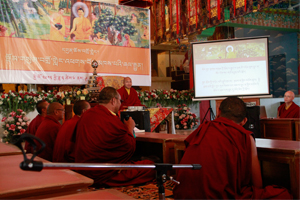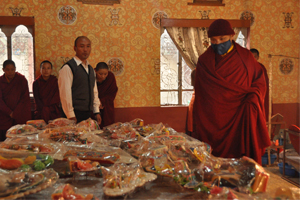Februrary 7-9, 2012 – Bodhgaya.
On Tuesday 7 February the Gyalwang Karmapa inaugurated a three-day scholarly conference, as part of the 15th Annual Kagyu Winter Debate (Kagyu Gunchö) at Tergar Monastery in Bodh Gaya. The focus of the conference was the relationship among the three levels of Buddhist ethical discipline ie the three vows (dom sum in Tibetan). Attending the conference were over 800 learned khenpos (senior monastic scholars), geshes and advanced students from Karma Kagyu monasteries and nunneries across the Himalayas.
Tibetan Buddhists uphold three levels of ethical discipline: 1) the pratimoksha vows that govern physical and verbal actions and are common to all Buddhists, 2) the bodhisattva vows that regulate thought as well as body and speech and are transmitted in all Mahayana traditions, and 3) the tantric vows that only the Tibetan traditions received from India and preserve to this day. These three levels of ethical discipline correspond to three forms of Buddhism that flourished in Indian Buddhism: the foundational system of which Theravada is the only surviving example, Mahayana and Vajrayana. Indian Buddhism was transmitted to Tibet from the 7th century onward, during a historical phase in which all were openly taught. Tibetan Buddhism alone maintains the active practice and study of all three forms of ethical discipline that characterized Indian Buddhism in its heyday.
Two years ago, there was a similar conference which concentrated on the individual liberation vows. This year’s conference focused on the bodhisattva vows.
Prior to this year’s conference, leading Karma Kagyu scholars and the Gyalwang Karmapa himself spent months researching a wide range of Indian and Tibetan textual sources which address the topic. The group of senior scholars met daily with the Gyalwang Karmapa to pore over ancient Indian scriptures as well as later Tibetan commentarial treatises. During the conference, the scholars presented the findings of their collective research to the assembly, and opened the topics for general discussion and lively debate.
The first day’s discussion focused on different rituals and traditions for taking the bodhisattva vows. Gyalwang Karmapa spoke briefly on the historical background and the differences among the six different Indian systems and the four principal Tibetan schools of philosophy.
On the second day, the focus was on issues that arise in upholding the various forms of ethical discipline, with an eye to finding harmony among all three levels of vows. The afternoon session included discussion of contemporary ethical issues, such as abortion, sexual relationships, and fine points related to theft, in relation to upholding or breaking vows.
The third day covered how to resolve apparent conflicts between the vows, and how the bodhisattva vows may be restored after violations.
In addition, His Holiness contributed his own perspective on three other issues he regards as important: vegetarianism, protecting the environment, and whether monks and nuns should be involved in political activities in Tibetan society. The conference concluded with a feedback session. Gyalwang Karmapa asked for comments on this year’s conference from those who had attended, both scholars and students, and suggestions for the next conference.
In the afternoon, the Gyalwang Karmapa made a short visit to the Bhutanese Monastery in order to check on the progress of this year’s butter sculptures. The eight butter sculptures (Tib. torma ) for Monlam 2012 portray lineage masters of the four schools of Tibetan Buddhism, and the Four Great Deeds of Lord Buddha – his birth, enlightenment, teaching the Dharma, and his parinirvana. In addition, twelve special butter sculptures have been commissioned for use in the ceremonies to be held on the final day of the Monlam which will be at the Monlam Ground not the Mahabodhi Stupa. These twelve include ones depicting the three fathers of the Kagyu tradition, Marpa Lotsawa, Jetsun Milarepa and Lord Gampopa.
click for video




